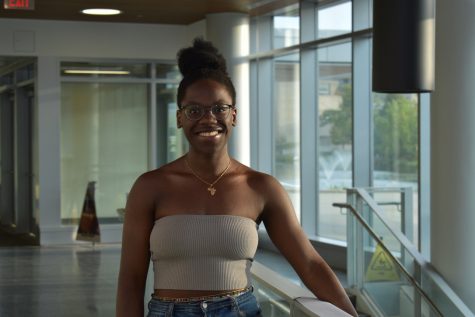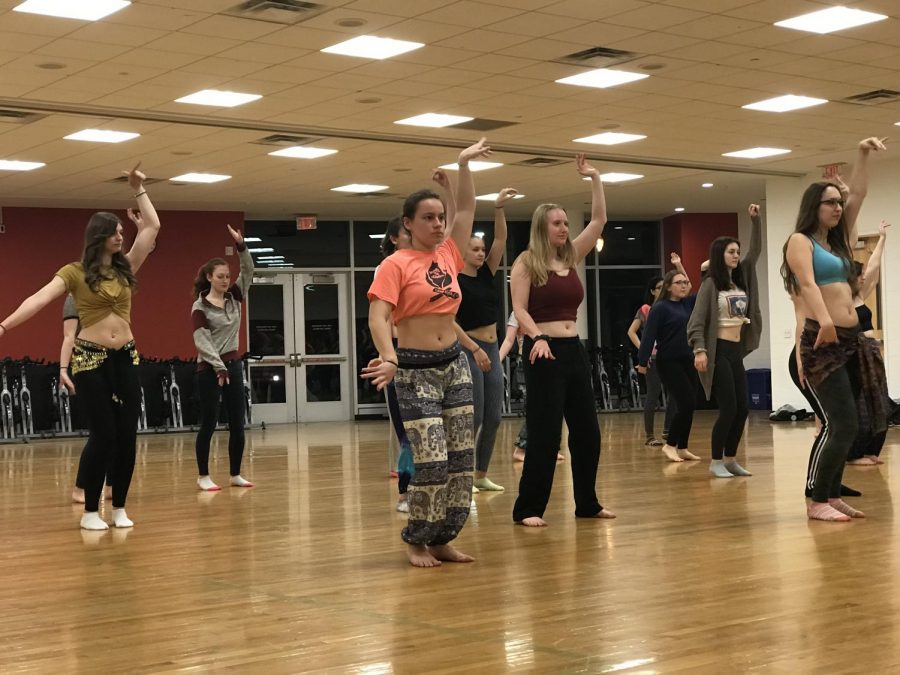Body Positivity and Self-Love: Belly Dancing
(Sifa Kasongo/Amherst Wire)
Being a part of the Belly Dance club (UBDC) has been an empowering feeling for many women at the University of Massachusetts Amherst.
There is a lot of pressure for women to be a certain weight and size and scrolling through social media or looking at a magazine makes some women feel self-conscious about their body and UBDC is trying to change that.
“A woman’s body no matter what the shape, is beautiful and should be celebrated,” said President of UBDC, Nicole Tschuor.
Eboard members discovered that the best approach to teach their members that their bodies are beautiful and in their own way, they’re beautiful, is through a dance that is focused on their bodies.
UBDC was created to fight against the body sigma around women, what they wear and around belly dancing. Few people appreciate the diverse nature of belly dancing and often see it as an erotic form of entertainment, striptease, burlesque and cabaret. However, people don’t realize that it has been a form of dance that is uplifting for many women.
Lindsey Thunberg, costume coordinator, was conflicted on whether to join UBDC and questioned joining because when she would go to the beach, she would never wear a bikini or take her shirt off. Going in, she had expectations that everyone in the room would have a “perfect body” that many women see on social media and that everyone was going to be judgemental. However, on her first day, she was welcomed and accepted for who she was.
“Looking around, there were people smaller than me, people larger than me, people shorter than me, taller than me, with more curves than me, less curves,” said Thunberg. “There were people of all different body types and there was no one that was more beautiful than the other.”
Being a part of UBDC gave Thunberg and other women confidence in their body. Growing up, Meagan Olson, freshmen neuroscience and biology major, was always self-conscious about her body but joining belly dancing in Fall 2018 has helped her learn how to love herself. Going to practice every Monday after a long day is a “treat” and an uplifting experience for Olson.
When dancing in front of many people on stage, with a spotlight shining down on you, there is nowhere hide.
When Tschuor’s grandmother would knit her crop tops, she always dreaded wearing them, and when she did wear them, her arms were always crossed because she felt uncomfortable with the way it looked on her body.
Compared to how she was before UBDC, Tschuor sees just how free and open she is to wear whatever she wants and not worry about what people think.
Belly dancing has helped many women appreciate their own beauty and encourages a positive body image through various dance styles.
UBDU performs several times a year, with each performance being different. During Fall 2018, they performed American tribal, and in previous semesters they have performed Spanish Fusion, Gothic-tribal and Chinese Fusion. Since belly dancing is not performed in one specific culture and region, their goal is to teach students about the beauty, culture, and technique behind the ancient art of belly dance.
“We really want everybody to learn every culture that touches belly dance,” said Tschuor. “Belly dance also incorporates fusion with a lot of other dances.”
This semester, on April 28 from 7 p.m. to 9.m. at Totman Gym, UBDC will perform three different sub-dances that make up their main dance. The first one being American-tribal, second being Egyptian and the last being an African Fusion style.
Belly dancing club is open to students of all levels and if you are a beginner, members will help you go through every step of the choreography and review different movements and basic structure.
UBDC runs the club in a way that anybody can be comfortable performing. If students wear, for example, a hijab, they can incorporate that into the costume and if dancers are uncomfortable exposing your stomach, they will make adjustments and find ways to add more fabric to the costume. They also welcome all genders and identities.
To find out more about the club, visit UMass Campus Pulse.
Email Sifa Kasongo at Skasongo@umass.edu and follow her on twitter @Sifa_Kas

"It is what we make out of what we have, not what we are given, that separates one person from another." - Nelson Mandela
Email Sifa at Skasongo@umass.edu

